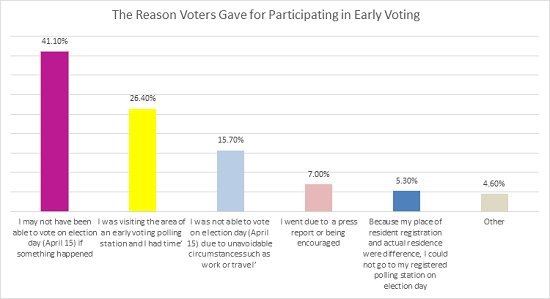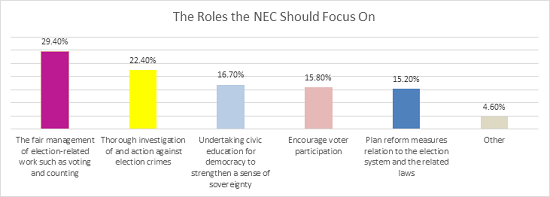News
Press Releases
HOME News Press Releases
| 3rd Voters Consciousness Survey Results Released, 93.3% Said ‘Early Voting Helped Voters Participate in Voters’ | |||||||||||||||||||||||||||||||||||||||||||||||||||||||||||||||||||||||
|---|---|---|---|---|---|---|---|---|---|---|---|---|---|---|---|---|---|---|---|---|---|---|---|---|---|---|---|---|---|---|---|---|---|---|---|---|---|---|---|---|---|---|---|---|---|---|---|---|---|---|---|---|---|---|---|---|---|---|---|---|---|---|---|---|---|---|---|---|---|---|---|
|
Date :06/03/2020Read : 142 |
|||||||||||||||||||||||||||||||||||||||||||||||||||||||||||||||||||||||
|
= When asked when they chose which candidate to support, the answer that the highest number of voters gave was ‘3 weeks or more before election day’ at 41.8% =
According to the results of the 3rd Voters Consciousness Survey on voter participation and early voting conducted by The National Election Commission (NEC) of the Republic of Korea targeting voters after the election day regarding the 21st National Assembly elections held on April 15, 93.3% of voters answered that early voting helped voters participate in voting.
For these National Assembly elections, 94.2% of voters answered that they knew about early voting, and 93.3% answered that early voting helps voters participate in the elections.
Compared to the 20th National Assembly elections, it was found that both the awareness of early voting and the recognition that early voting helped voters participate in voting increased.
Awareness of Early Voting (%)
Usefulness of Early Voting (%)
When asked the question on the improvement of the current early voting system, the answer ''the current system should be maintained'' has the highest response rate with 64.0% followed by ‘the number of early voting polling stations set up should be increased’ (17.7%) and ‘the early voting hours and period should be extended’ (11.4%).
Early Voting Participation
When asked for the reason they decided to participate in early voting, the most common reason given was ‘I may not have been able to vote on election day if something happened’ (41.1%) followed by other reasons including ‘I was visiting the area of an early voting polling station and I had time’ (26.4%) and ‘I was not able to vote on election day due to unavoidable circumstances’ (15.7%).
Election Interest and Voting Behavior
The percentage of voters for these National Assembly elections that answered ‘I am interested’ in the elections was 77.3% elections (very interested 25.9% and quite interested 51.4%), which is 16.3 percentage points higher when compared with the 20th National Assembly elections.
Interest in the Elections (%)
When Voters Decided to Vote for a Candidate and Considerations When Choosing a Candidate
When voters who cast their ballot in these National Assembly elections were asked when they decided to vote for a candidate, the most common response was ‘three weeks or more before election day’ (41.8%) followed by ‘one week before election day’ (19.3%) and ‘two weeks before election day’ (13.6%).
When Voters Decided Which Candidate to Support (Vote, %)
Meanwhile, the reasons voters gave for choosing to support a candidate in constituency member elections in order were ‘the candidate’s affiliated party’ (41.9%), ‘the candidate’s character and abilities’ (24.6%) and ‘the candidate’s policies and pledges’ (20.7%). The reasons voters gave for choosing to a party to support in proportional representation member elections in order were ‘I chose the same party as the candidate I vote for in constituency member elections’ (39.1%) and ‘the party’s policies and pledges’ (32.0%). Election Information Dissemination
When voters who cast their ballot in these National Assembly elections were asked about the provision of information available to them when choosing a candidate, 62.6% responded they has ‘sufficient’ information (fully sufficient 10.2% and mostly sufficient 52.4%) and the most useful channels for receiving information were ‘articles and reports from the media, including TV and newspapers’ and ‘conversations with family, friends and neighbors.’
In addition, 80.0% of all voter respondents answered that ‘it was helpful’ when asked if the election information broadcast on the e-TV channel set up by the National Election Commission was helpful to them.
Efficacy of Elections and Voting
As a result of surveying the efficacy that voters expected from elections and voting, 69.9% of the voters answered that they agreed with the view that ''the future of the country can be changed through elections,'' 68.6% agreed with the view that ‘my vote during an election has a major impact on the outcome,’ and finally 50.2% agreed with the view that ‘elections can change my daily life and my quality of life.’
Assessment of Election Fairness
When asked how cleanly these National Assembly elections were held, 64.7% evaluated them as ‘clean’ (very clean 8.2% and somewhat clean 56.5%), which is higher than results from the first survey (49.8%) and second survey (55.8%) held before election day.
Fairness of National Assembly Elections (%)
The most common reason people who evaluated the election as fair gave was that ‘the increase in voter’s awareness of fair elections’ (44.9%).
In addition, when looking at problems during these elections, ‘abuse of unrealistic policies’ (44.6%) was the highest opinion given, and the most common response given to a question on how to fix issues related to fair elections was ‘political parties, candidates and campaigners should obey the election law’ with 23.0%.
Evaluation of the NEC’s Activities
When asked about the NEC’s activities, political neutrality and fairness in carrying out its duties, 59.1% said that NEC was ‘doing well’ (Very well 3.9% and doing fairly well 55.2%), which was 2.2% points higher than during the 20th National Assembly elections (56.9%).
41.9% of respondents said they had heard of the NEC’s election campaign slogan ‘Beautiful Elections, Happy Korea’ and 75.0% of those respondents said they liked it. When compared with the 20th National Assembly elections, both awareness of the NEC slogan (then 35.6%) and favorability (then 70.4%) have increased.
Major Tasks of the NEC
When asked about what part of the process the NEC should focus on, the most common response was ‘the fair management of election-related work such as voting and counting’ (29.4%) followed by answers such as ‘thorough investigation of and action against election crimes’ (22.4%) and ‘undertaking civic education for democracy to strengthen a sense of sovereignty’ (16.7%).
The survey was done by Gallup Korea and was commissioned by the NEC. It was done using one to one Tablet Assisted Personal Interviewing (TAPI) from April 16 to May 6 with a sample of 1,500 Korean citizens aged 18 years old or more. The sample error was 2.5 percentage points up or down at a 95% confidence level and the sample was chosen to reflect the gender, age and the number of registered residents by region as of March 2020. |
|||||||||||||||||||||||||||||||||||||||||||||||||||||||||||||||||||||||
| Next NEC Chairperson Kwon Soon-il Submitted His Resignation |
| Before NEC to Prepare Voting and Counting Without Disruptions |



